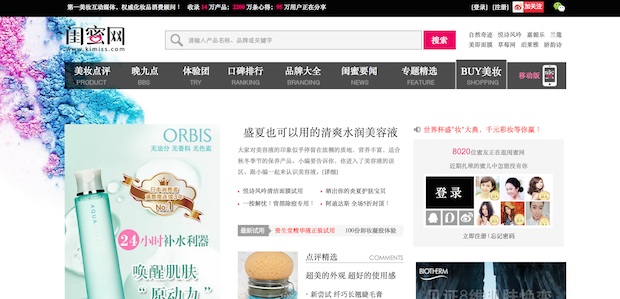The e-commerce in China is not to miss!
If it is now clear that the e-commerce sector is slowing down in Western countries, it is far from the case in China since it is only the beginning of the e-commerce adventure for companies that had the courage to take a leap.
If you already heard that China was the place you should not miss at the moment, nobody lied to you! In 2013, 618 million Chinese were already connected to the Internet, this represents a penetration rate of 46% and with the rise of e-commerce companies, starting with Alibaba and Tencent that are part of the 10 most powerful companies of the country, we can be sure that the market is promising.
China overthrow the US as the leader on the global cosmetics market
Still not convinced? Last year, China took the first seat of the global e-commerce market in front of the USA. The country’s on-line spending verged on €155 billion last year and by 2015, it is more than €400 billion that China will received from the e-commerce markets. It represents the French, English, German, Japanese and American market gather together.
On all products that can be found on the Internet, buying cosmetics upon online platforms is very popular. Consumers are being delivered directly to their home, pay less for the product than in store and have all the information necessary within reach of few click. E-commerce has changed consumer habits.
The on-line cosmetics industry
The growth of e-commerce approximate in general 40% every year and the total value of transactions is € 354 billion. However, the cosmetics industry has no reason to be jealous! Second largest market in the world behind the Western Europe one, it annual growth is around 15%.
While 20 years from now cosmetic products income was barely reaching € 25 million, today, it totalized more than € 25 billion, of which € 7 billion of them are generated by the e-commerce industry. Euromonitor forecasts that luxury treatments, involving the skin care such as anti-age and rejuvenating cream, which is already amassing € 3.5 billion will double their income by the next 3 years thanks to the middle class and wealthy Chinese number increasing.
Women and cosmetics are made to be together
In addition, women play a particularly important role in this growth. They contribute to more than half of the on-line purchases. Despite the fact that they are in a minority, they spend more than men on the Internet. For example, 60% of consumers who spend more than € 12,000 annually through Internet are women. Their purchasing power has increased dramatically and they are more empowered than before. Besides that, they consider online shopping as a fun and entertaining hobby.
However, this is no mean feat to break into this market. It is very sensitive to trends and brand can take off just like put out of business after a simple opinion leader’s observation or a disgruntled user. The key is to equip your company with with a good distribution network in order to reach Chinese provinces (which is ordering more and more from the e-commerce), not getting lost in the mass of customers and settle a target consumer type and finally maintain a good reputation.
The internation brand domination
The area is mainly occupied by international brands products. For example, the 10 largest market share (50% of the market) are shared between the American Procter & Gamble, the French brand L’Oréal, the Japanese Shiseido et the English Unilever. The rest of the market is dominated by foreign brands and local brands are often struggling to find a place in the sun and often dominates the low-end market.
`The cosmetics market is very competitive and in addition to the large number of brands in the sector, the e-commerce is teeming with counterfeit goods. That is the reason why the giant from the industry invented e-shopping platforms that allow cosmetic brands to open their own account (such as a mini website) to ensure their products authenticity and to enjoy a huge community of consumers. However, these platforms are more advantageous for customers than for brands.
Why do consumers buy on-line?
Brands understood it well, with 25% of cosmetics sales made on the Internet, you can find all brands, international just like local, that whether have their own website or are present on an e-shopping platform. These platforms are particularly popular in China because they certify the products and brands authenticity, they are often prices promotions (which makes them way less expensive that on regular store) and allow users to chat with each other and share freely their opinion about brands and products.
Where do you have to be in the e-commerce jungle?
On which platforms should you be now if you want to sell your cosmetics? Without hesitation Kimiss, Yoka, Meilishuo, Pclady and also Jumei. These are the favourite places of Chinese consumers. On these sites, they can easily and quickly find all the brands they want at competitive prices.
Prices are also way below what is found in stores and this is one main reason why Chinese are buying on these platforms. They believe that since there is no additional cost of wages or rent, they should pay less expensive. These platforms are a real treasure regarding promotional offers. This functioning is very popular in China as it allows consumers to compare price within reach of few click, and this is priceless!




5 comments
gg_huanyi
Hi there! Are you sure that only 25% of the cosmetics market takes place online?? I am a beginner and don’t know much about it, very instructive content! I feel like everyone is buying everything online ahah
Reginald Hook
I agree! Good content. If you don’t have a strong online presence, you will never sell in China! Chinese consumers don’t have time, they buy everything fast and online from home, thanks to e-commerce platforms or social media. Good good!
mansix
you have a good site
william
Good article. I’m not so sure the landscape has changed so much as some of these Western companies became complacent, or maybe they never really did understand. China makes the rules. Foreign companies are guests in China, no matter how long they have been here or how much it feels like they have become an intergral part of modern China. McDonald’s and YUM brought this on themselves by forgetting to be vigilant with suppliers that are notorious for cutting corners. GSK broke the law. You can argue that they wouldn’t have a market in China without bribing their way in, but there are many different ways to approach this. Cash payments is not one of them.
You didn’t mention Google, but like McD’s and YUM, they are shut out of the market by their own choosing. Ironically, they also fall into the first category of companies that cannot afford NOT to be in China, but because of their refusal to comply with local requirements, they get HK and Baidu gets a China-wide monopoly. Stupid! At the other end of the spectrum are companies like UBS who came to China early and demonstrated unwavering commitment to business in China. For this, the government has rewarded them handsomely for their loyalty and ability to follow the rules.
CEO of Expertchina efashion
Exactly! One more aspect why one cannot NOT do business in China: the Chinese are going global. If one does not learn how to compete with the Chinese on their turf, it will happen somewhere else. Or, one may find oneself being acquired by the Chinese. Which case is most probable in your line of business?